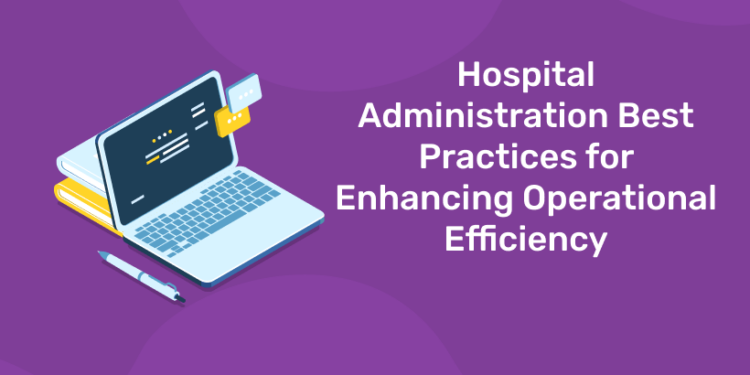Table of Contents
In the ever changing world of healthcare hospital administrators are the backbone of the facility, they need to ensure operations run smoothly, costs are controlled and patient care is at its best. As the backbone of the facility administrators need to adopt best practices that improves operational efficiency, streamline processes and ultimately the patient experience. This blog will explore some strategies and tips for hospital administrators for Enhancing Operational Efficiency
The Importance of Enhancing Operational Efficiency in Hospitals
Operational efficiency in hospitals for:
- Patient Care: Better patient outcomes, shorter wait times and higher patient satisfaction.
- Cost Management: Reduce waste and optimize resource use to control costs and allocate funds better.
- Staff Productivity: Streamline processes so healthcare professionals can focus more on patient care and less on administrative work.
- Compliance and Safety: Efficient operations ensures compliance and patient safety by reducing errors.
Explore Your Future in Healthcare Management! Enroll now
The Crucial Role of Hospital Administrators in Enhancing Operational Efficiency
1: What is the primary role of a hospital administrator?
Hospital administrators are the behind the scenes heroes, conducting the orchestra of healthcare to get the perfect harmony of patient care, smooth operations and overall organizational effectiveness.
Their role goes way beyond administrative tasks; they are the architects of a hospital’s success, shaping its identity, reputation and impact on the community.
- Seamless Operations: Hospital administrators are the glue that holds the whole healthcare operation together. They allocate resources, streamline processes and coordinate departments to make the hospital run like clockwork.
- Patient Care: The core of healthcare administration is about patient care. Administrators create an environment where patient safety, comfort and well-being is paramount. They develop protocols and guidelines that ensure healthcare professionals deliver evidence based care, adhere to ethical standards and follow best practice.
- Strategic Decision Making for Excellence: Hospital administrators are responsible for strategic decision making that shapes the direction of the organization. From expanding services to adopting new technology, administrators anticipate industry trends and implement initiatives that improve patient experience and clinical outcomes.
- Efficiency and Effectiveness: The impact of hospital administrators on an organization’s efficiency and effectiveness is huge. Through data analysis, they identify blockages, streamline processes and implement changes that maximize resource utilization.
- Building Networks: Administrators build relationships within the healthcare ecosystem. They bridge the gap between clinical teams, support staff, patients and external stakeholders.
- Innovate for Excellence: Administrators drive innovation within healthcare organizations. They use technology, best practice and new models of care to stay ahead of the curve of healthcare excellence.
In summary, hospital administrators are the architects of the whole healthcare experience.
Their leadership, strategic thinking and commitment to patient care shapes the organization’s identity, reputation and legacy.
Through their hard work, administrators raise the standard of care, drive efficiency and make way for healthcare organizations to serve the community.
Hospital Administration Course with Assured Career Growth
Hospital Administration Course by Entri App: Master essential healthcare management skills, gain certification, and secure top roles in leading hospitals
Join Now!Best Practices to Enhancing Operational Efficiency
1. Implement Lean Management Principles
Lean management is all about minimizing waste and maximizing value. Hospitals can adopt lean principles by:
- Identifying Waste: Regularly review processes to identify and eliminate non value added activities.
- Standardizing Procedures: Create standardized protocols to ensure consistency and reduce variability.
- Continuous Improvement: Encourage staff to suggest improvements and implement changes incrementally.
2. Leverage Technology and Automation
Technology can help improve operational efficiency in hospitals:
- Electronic Health Records (EHRs): Implementing EHRs can streamline patient data management, reduce paperwork and improve communication.
- Automated Scheduling Systems: Automating staff and patient scheduling can reduce errors and improve resource allocation.
- Telemedicine: Expand telemedicine services to improve access to care and reduce in-person visits.
3. Optimize Supply Chain Management
Supply chain management ensures hospitals have the necessary supplies without overstocking:
- Inventory Management Systems: Implement advanced inventory management systems to track supply levels in real time.
- Vendor Relationships: Build strong relationships with reliable vendors to ensure timely delivery and better pricing.
- Demand Forecasting: Use historical data to forecast demand to plan and avoid stockouts or excess inventory.
4. Communication and Collaboration
- Interdisciplinary Teams: Encourage interdisciplinary teams to promote collaboration and holistic patient care.
- Communication Platforms: Use secure communication platforms to share information and coordinate.
- Regular Meetings: Hold regular meetings to discuss performance and address issues.
5. Focus on Patient-Centered Care
Patient centric care improves patient satisfaction and outcomes:
- Patient Feedback: Collect and act on patient feedback regularly to identify areas to improve.
- Personalised Care Plans: Create care plans based on patient needs and preferences.
- Patient Education: Provide patients with information to make informed decisions about their care.
6. Invest in Staff Training and Development
A well-trained and motivated workforce is essential for operational efficiency:
- Continuous Education: Encouraging staff to pursue continuous education and professional development.
- Training Programs: Implementing comprehensive training programs for new technologies and processes.
- Recognition and Rewards: Recognizing and rewarding staff for their contributions can boost morale and productivity.
| Also Read | |
|---|---|
|
Case Studies of Successful Hospital Administration Initiatives |
|
|
Importance of Communication Skills in Hospital Administration Jobs |
|
Explore Your Future in Healthcare Management! Enroll now
Tips to do for Enhancing Operational Efficiency
Here are some strategies healthcare organizations can use to improve their processes and deliver better care at lower cost:
- Use evidence-based practices: Evidence-based practices are medical interventions that have been proven through scientific research to work. By using these practices, healthcare organizations can improve patient outcomes and reduce costs by avoiding unnecessary tests, procedures and treatments.
- Focus on prevention: Preventive care can address health issues before they become more serious and require more expensive treatments. Healthcare organizations can encourage patients to live healthy and provide preventive services like screenings and vaccinations.
- Reduce waste and inefficiency: Healthcare organizations can reduce waste and inefficiency by improving processes like inventory management, reducing wait times and eliminating unnecessary tests or procedures.
- Work with other providers: Working with other healthcare providers like hospitals and primary care providers can improve care coordination and reduce duplication of services which can lead to lower costs.
- Engage patients: Engaging patients in their own care can improve outcomes and reduce costs. Healthcare organizations can provide education and resources to patients to manage their conditions and make informed decisions about their care.
Entri’s Hospital and Healthcare Administration Course
To support hospital administrators in adopting these best practices, Entri offers a comprehensive Hospital and Healthcare Administration Course. This course covers essential topics such as healthcare management principles, financial management, regulatory compliance, and leadership skills. By enrolling in this course, enhancing Operational Efficiency in hospital administrators can gain the knowledge and skills needed to enhance operational efficiency and lead their organizations effectively.
Conclusion
Enhancing operational efficiency is paramount in hospital administration. By implementing lean management principles, leveraging technology, optimizing supply chain management, enhancing communication, focusing on patient-centered care, investing in staff training, and utilizing data analytics, hospital administrators can significantly improve the performance of their healthcare facilities. Continuous education, such as Entri’s Hospital and Healthcare Administration Course, plays a crucial role in equipping administrators with the tools and knowledge needed to drive these improvements. By adopting these best practices, hospital administrators can ensure that their facilities provide high-quality care while managing costs and improving overall efficiency.
Hospital Administration Course with Assured Career Growth
Hospital Administration Course by Entri App: Master essential healthcare management skills, gain certification, and secure top roles in leading hospitals
Join Now!Frequently Asked Questions
What are some best practices for improving operational efficiency in hospital administration?
Implementing lean management principles, leveraging technology and automation, optimizing supply chain management, enhancing communication and collaboration, focusing on patient-centered care, investing in staff training and development, and utilizing data analytics are some of the best practices for improving operational efficiency in hospital administration.
How can lean management principles be applied in hospitals?
Lean management principles can be applied in hospitals by identifying waste, standardizing procedures, and encouraging continuous improvement. This approach minimizes non-value-added activities and ensures consistency in operations.
How does technology improve hospital operational efficiency?
Technology improves hospital operational efficiency by streamlining patient data management with electronic health records (EHRs), automating scheduling systems, and expanding telemedicine services. These advancements reduce paperwork, improve resource allocation, and enhance access to care.
How does patient-centered care enhance operational efficiency?
Patient-centered care enhances operational efficiency by improving patient satisfaction and outcomes. Collecting patient feedback, developing personalized care plans, and providing patient education help tailor services to individual needs, reducing inefficiencies.
What is Entri's Hospital and Healthcare Administration Course?
Entri’s Hospital and Healthcare Administration Course is a comprehensive program covering healthcare management principles, financial management, regulatory compliance, and leadership skills. It equips hospital administrators with the knowledge and tools needed to enhance operational efficiency and lead their organizations effectively.
How can hospital administrators enroll in Entri's Hospital and Healthcare Administration Course?
Hospital administrators can enroll in Entri’s Hospital and Healthcare Administration Course by visiting the course page on Entri’s website and following the enrollment instructions. The course offers flexible learning options and is designed to fit the busy schedules of healthcare professionals.












